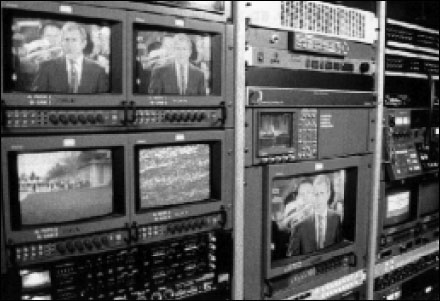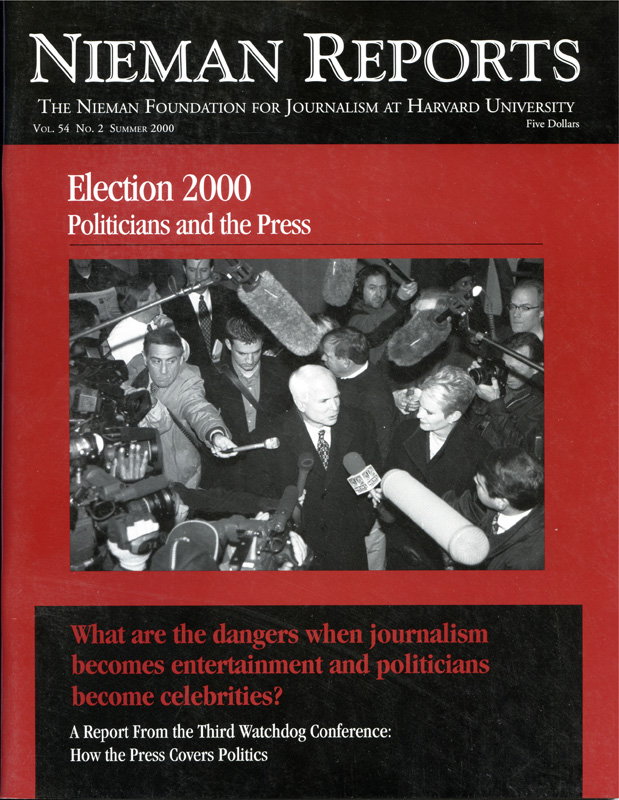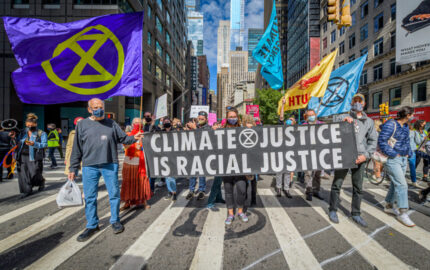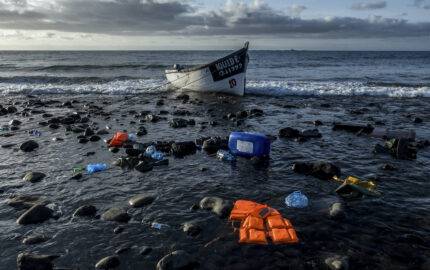
Photo © Colin Franzen/U.C. Berkeley Graduate School of Journalism,
Center for Photography.
Bill Kovach, Curator, Nieman Foundation: “We have created a communication system with the new technology during the last two decades in which it looks as though we’re creating new classes of information-rich people. We have an older generation that gets most of its political news off of television. I think we’ve had enough surveys to convince us that most of the political information that the broad public get is from television.
“And we have a younger generation that increasingly is getting much of its information off of the Internet. And we have a ruling elite that knows neither of those two worlds. The people who run the economic institutions and the political institutions of this country don’t watch television and they don’t surf the Internet. So there’s an information gap between these three groups of people. And I don’t know how we begin to figure how the press fills those gaps and communicates between those groups of people. A survey like the one conducted by Pew could perhaps be affected by the fact that significant groups of people have significantly different information pools, so that no issue is going to gather a significant group of people.”
Andrew Kohut, Director, The Pew Research Center for The People & The Press: “There’s no question that there’s more diversity in the way people get their news now than there was 10 years ago, 20 years ago. This particular survey shows a dramatic increase in the percentage of people who say they principally rely on the Internet for national and international news. At the beginning of the year we asked that question and found six percent of the respondents saying that’s how they primarily got their news. In our September survey it was 11 percent. So the Internet is coming on very fast. If you look at the people who use the Internet for news, their interests aren’t materially different and their levels of engagement aren’t materially different than that of people who don’t use the Internet, and this is because of two countervailing forces.
“One, they’re better educated. This would lead them to know more about issues and care more. But on the other hand, they’re younger. And the biggest difference, the biggest factor that separates those who are engaged and those who are disengaged, is age. The youngest generation, Generation X, and the younger element of the baby boom generation are generations that haven’t had the news habit nearly to the degree that older generations have and haven’t participated in voting and other civic ways that these previous generations do. So you don’t see an enormous difference between the Internet audience and the general news audience at this point.”
Gwen Ifill, senior correspondent, “The NewsHour with Jim Lehrer” and Moderator of “Washington Week in Review”: “When we talk about the press we fall into kind of old-fashioned notions of what the press is, as if we all speak with one voice and cover things the same way. As somebody who’s spent 15 years in print and only the last five or so years in television, I’m here to tell you that there is a dramatic difference in the way print and television cover the same events. And it’s changed dramatically in the last five years in television. The advent of all-news or so-called all-news cable networks has really changed the way the debate is driven. And if you’re a responsible viewer or reader you have to know that there are lots of places to get your information. The Internet didn’t exist in the way it does five years ago. And newspapers didn’t cover things with the variety that they do right now.
“You can pick up The Washington Post and read a seven-part profile of George W. Bush, but you’ll also read the stories that begin, ‘In a blow to his faltering campaign….’ You have it all. But the biggest problem is the fact that so much of our coverage in politics and everything else is being driven by the soap opera mentality. The idea that there has to be a running story and that every night there’s got to be a snapshot with a punchy question in which somebody has to say ‘yes’ or ‘no’ and that’s all there is to it. That doesn’t really bring enlightenment. I’m not even sure it brings viewers. But it’s part of the way that we cover the news now. And it’s not changing. We’re not going backward. We have to figure out a way in our responsible coverage to integrate the fact that people are getting their news a lot of different ways, and they’re asking questions in a lot of different ways. And ways which are not satisfying to journalistic purists but also may not be satisfying to people who would much rather be watching a rerun of ‘Friends.’ So that’s just a challenge that we kind of have not only in this year and not only in politics, but in everything we cover.”
Lee Hamilton, former congressman from Indiana: “One of the questions I repeatedly got in town meetings in Indiana was, ‘Congressman, what can I read that will give me the truth?’ I think Gwen Ifill has the right answer. There isn’t any one thing you can read that can give you the truth. You just have to consult multiple sources to try to understand the complex problems that we have around us today. And you’ve got to figure out that almost every source has their own bias, has their own perspective on the problem. What this means is that the citizen in a democracy in a representative government has a very heavy burden. It is the citizen’s job to sort through all of these sources of information to try to find out the truth.”
Geraldine Ferraro, former vice presidential candidate and former CNN political commentator: “Here comes the cynic again. I think both of you are presuming that we’re talking about an educated consumer and somebody who has also a lot of time to get the information. I don’t think that’s a given…. I’m not saying it’s because they’re not smart enough. I’m saying it is because in some instances people are too busy, in some instances people don’t have the money to buy the three or four newspapers that a lot of us who live in big cities buy every day. And so I think those are all pieces that aren’t there, which then makes your responsibility even greater. Because if you’re not giving it to them straight, if you’re expecting them to go from place to place, it’s not being done.”
During the second panel, focusing on the presidential campaign, no mention was made of the role the Internet is playing in election coverage. Kathryn Kross, a producer with ABC News’s “Nightline,” introduced the subject with a question to the panel members.
Kathryn Kross: “Interesting that the Internet hasn’t come up. And I am wondering for the journalists on the panel how the Internet changes what you do and how you do it. Especially assuming that we’re moving towards a situation where news organizations can track politicians, their records, their stances. Like Steven Brill said, ‘You can have a yes, no and wouldn’t answer kind of column.’ How does that change what we do and how we do it?”
Susan Page: “It’s such a huge resource for voters or people who are interested. I mean, now they don’t need to hear an account of what a politician said in a speech. They can go online and read the speech or even hear the speech. It acts as kind of a safeguard against misquoting somebody. About two years ago I pulled a Newt Gingrich quote out of a wire story and put it in a story. I must have gotten 15 calls from people who had read it on the wire or read it on the Web and felt it wasn’t fair, that it had been pulled out of context. I think in that way it’s incredibly useful. I think it changes to some degree what it is we do. Because the things that we go out and cover that used to be exclusively ours now belong to everybody.”
Michael Kelly, Editor in Chief, National Journal: “…it has already pretty much destroyed the old media’s ability to serve as a filter, to decide what is and is not fit to print and fit to air. …Susan’s other point about the information, it’s extraordinary the way this has changed everything. It’s changed what it means to be a reporter.
“I was doing a column a while back on proposed regulation to change federal banking regulations. I think it was called the ‘Know Your Customer Act.’ Should have been the ‘Big Brother Act.’ It was a proposed regulation to tell banks across the country that they had to file with the federal government a whole set of personal information about their customers, beyond the stuff we have now, if there’s a $10,000 withdrawal. The federal agency put up the proposed regulation change and all of the supporting documents on its Web site as a public service during the comment period. This agency told me they usually get 250 to 300 comments. This time various talk radio hosts and organized groups and so on found it on the Web page and sent it all over the Internet. They got 11,000 comments. All but one was negative and this wasn’t brought to them courtesy of any of us. It was just out there. And they had to scrap the regulation. That kind of thing has changed all the dynamics.”
Judy Woodruff, Anchor and senior correspondent, CNN: “Hasn’t it in a way made the news media more important from the standpoint that somebody’s got to be going through this massive list of comments, issues, whatever and deciding this may be more important? You may argue that we may not be the ones who should be fulfilling that function, but otherwise the public is faced with unfiltered news. Is that OK? Maybe that is OK.”
David Broder, columnist, The Washington Post: “Some people want it sorted for them and some people want to do the sorting for themselves. There are plenty of shortcomings in the press or the media, some of which we’ve touched on here today. The great boon is, and I see it in my reporting when I’m out of this city, you can go into any community of any size now in America and you will find a self-selected group of people who are every bit as well attuned to what’s going on in public affairs and every bit as well informed as anybody you’d run into at The Brookings Institution or Heritage Foundation. They’re with it. For them this is a golden age because you’ve got the Internet, you’ve got NPR, you’ve got cable news channels. You’ve got C-SPAN. You’ve got three national newspapers that we never had through most of our history, two of which happen to be among the very best papers in the country and USA Today is week by week a better and more serious paper than it was the week before. It’s a great time for people who want to be informed.”



